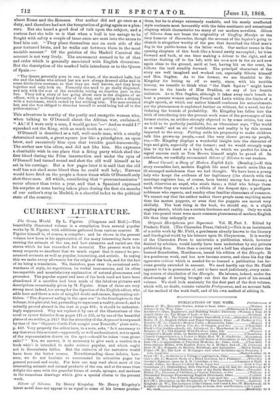Si/cote of Silcotes. By Henry Kingsley. Mr. Henry Kingsley's latest
novel does not appear to us equal to some of his former prodo.c- tions, but he is always extremely readable, and his manly unaffected style contrasts most favourably with the false sentiment and sensational claptrap which characterize too many of our modern novelists. &kola of Silcotes does not boast the originality of Geoffrey Hamlyn or the racy humour of Ilavenshoe, though the account of the Squire's going to church is altogether worthy of the pen that described the blind man's dog in the public-house in the latter. work. Our author seems in the opening chapters of this book like a hound newly uncoupled ; he tries forward and back, at one time making a detour to the right, and at another dashing off to the left, with his nose now in the air and now again close to the ground, until at last, having hit on the scent, he follows the trail steadily forward. The principal characters of the story are well imagined and worked out, especially Silcote himself and Mrs. Sugden. As to the former, we are thankful to Mr. Kingsley for letting us off so easily, since, with his terrible history, we tremble to think what "the Dark Squire" might have become in the hands of Miss Braddon, or any of her frantic- imitators. As to Mrs. Sugden, although it takes away one's breath to. hear a peasant woman quoting French and Latin within the limits of a single speech, at which our author himself confesses his astonishment, yet the phenomenon is explained further on without, for a novel, too far violating the bounds of probability. Mr. Kingsley has fallen into the trick of introducing into the present work some of the personages of his former stories, an artifice strongly objected to by some critics, but one we hold to be perfectly justifiable, for, as Obenroizer says, "The worll. is so small," and an air of truthfulness and reality is by this means imparted to the story. Putting aside his propensity to make children talk like grown-up people,—and like very clever grown-up people,. too,—Mr. Kingsley displays a wonderful insight into the character of boys and girls, especially of the former ; and we would strongly urge. him to try his hand at a boy's book, in which we predict for him a signal success such as Tom Brown himself might be proud of. In conclusion, we cordially recommend Silcote of Silcotes to our readers.






























 Previous page
Previous page